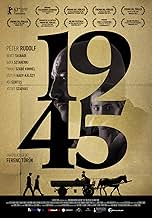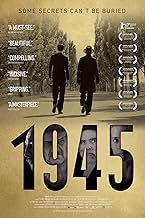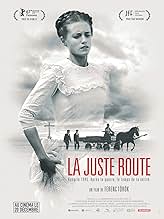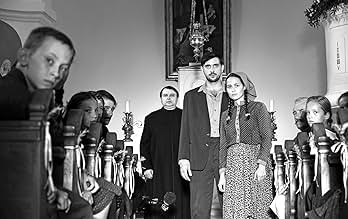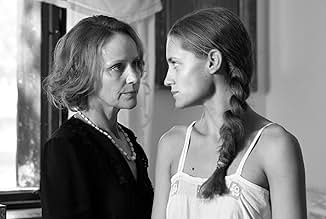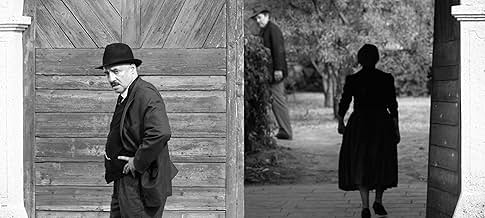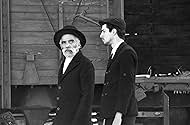AVALIAÇÃO DA IMDb
7,1/10
4,4 mil
SUA AVALIAÇÃO
12 de agosto de 1945, 11 da manhã. Dois estranhos misteriosos vestidos de preto aparecem na estação ferroviária de uma aldeia húngara.12 de agosto de 1945, 11 da manhã. Dois estranhos misteriosos vestidos de preto aparecem na estação ferroviária de uma aldeia húngara.12 de agosto de 1945, 11 da manhã. Dois estranhos misteriosos vestidos de preto aparecem na estação ferroviária de uma aldeia húngara.
- Direção
- Roteiristas
- Artistas
- Prêmios
- 7 vitórias e 5 indicações no total
Angelus Iván
- Sámuel Hermann
- (as Iván Angelusz)
- Direção
- Roteiristas
- Elenco e equipe completos
- Produção, bilheteria e muito mais no IMDbPro
Avaliações em destaque
Previous reviews have failed to take account of this film's "Sitz im Leben"-- the current situation in Hungary, where the Fidesz government under Orbán Viktor has played footsie with the broad swath of irredentist voters who continue to harbor anti-Semitic leanings. Hungary has not yet come to terms with its role in the murder of its Jewish citizens. For example, the recently erected monument to Victims of Nazi Aggression portrays Hungary as a Victim State, not as a willing cooperator in the execution of roughly 5% of the national population. But it was Hungarian officials that carried out the orders, not Germans. Hungarian officialdom and non-officialdom was more than willing to participate in the Holocaust, but they are loath to acknowledge any corporate responsibility.
A personal but illustrative anecdote. About seven years ago I was teaching at a gimnázium in a town not far from Budaptest and went to see the movie "Avatar" at a local theater over a weekend. The next Monday, as part of English conversation class, I told my students what I had done, that I had gone to thus and such theater to see the movie. The immediate response to my statement came from a student whom I had come to know as a pretty bright kid who was eager to learn. He said, "Oh yes, Jews own that theater."
Where the f*** did that come from? Over the past few years I have realized that it comes from the same deep-rooted inability of Hungarians to understand that their loss of territory after WWI and their continuing economic problems come not from their "enemies" (Jews above all, but Gypsies too) but from themselves and the same culture of self-deception and corruption that is depicted in this film.
Which film, by the way, is elegantly framed and carefully composed, is presented with almost stately precision, and which I highly, highly recommend.
A personal but illustrative anecdote. About seven years ago I was teaching at a gimnázium in a town not far from Budaptest and went to see the movie "Avatar" at a local theater over a weekend. The next Monday, as part of English conversation class, I told my students what I had done, that I had gone to thus and such theater to see the movie. The immediate response to my statement came from a student whom I had come to know as a pretty bright kid who was eager to learn. He said, "Oh yes, Jews own that theater."
Where the f*** did that come from? Over the past few years I have realized that it comes from the same deep-rooted inability of Hungarians to understand that their loss of territory after WWI and their continuing economic problems come not from their "enemies" (Jews above all, but Gypsies too) but from themselves and the same culture of self-deception and corruption that is depicted in this film.
Which film, by the way, is elegantly framed and carefully composed, is presented with almost stately precision, and which I highly, highly recommend.
It reminds me "The Visit of Old Lady" by Friedrich Durrenmatt. it reminds the Old Greak tragedies. in special sense. in specific manner. two Jews in a Hungarian village. two hutches. a way. a wedding. memories about dark past. and everything becomes different.
for me, a masterpiece. for the clash between minimalism of the presence of the two strangers and the community storm. for the performances. and impecable craft of story. but, more important, for the status of near story. from the past of grandparents of Central Europe. for the force of cinema to give a sort of social exorcisation. for the art to give the realistic portrait of a world. for define the sin. and the choices behind the deep fears. a film about hidden demons. memories. papers. ambitions of actuary. answer of a husband. indifference of a priest. decision of a son. and the train. in the station of a village.
for me, a masterpiece. for the clash between minimalism of the presence of the two strangers and the community storm. for the performances. and impecable craft of story. but, more important, for the status of near story. from the past of grandparents of Central Europe. for the force of cinema to give a sort of social exorcisation. for the art to give the realistic portrait of a world. for define the sin. and the choices behind the deep fears. a film about hidden demons. memories. papers. ambitions of actuary. answer of a husband. indifference of a priest. decision of a son. and the train. in the station of a village.
A very powerful and moving drama. A perfect illustration of human greed. The cinematography of Ferenc Török's team is technically perfect, the authoritative script, well-made costumes and the highly suggestive musical outline. A description of how the infamities perpetrated in the course of life are paid at a high price, on the one hand the devastated Jewish people and on the other those who wanted to take advantage in the bloody period of the war and the territory of none of the material possessions without any mercy. In conclusion, everyone pays, without exception, those who have lost their loved ones in the death camps and those who have lost them for their cruelty. The movements of the camera, the perspectives, the points of view and the objects in the frame are of high school and the film is shot in a beautiful and very clean black and white. The ending is masterful and I think that in my mind the images of the black smoke of the train that can be combined with the lives killed in the crematoria of the Nazi prison camps will never be erased, I cried for them. Magnificent work of art.
This movie is a masterpiece! It depicts antisemitism and guilt after WWII really well. The cinematography, the music and the direction are really stunning. Bergman would have loved it. 10/10. Never forget. We remember.
It's a brilliant story of guilt and buried secrets coming to the fore. Using the aesthetics of a western with direct borrowing from High Noon and from Sergio Leone, especially the waiting for the train scene in Once Upon a Time in the West. But in this case its used to point the complete absence of any real hero from the story. The most heroic act performed by any character in this movie is going away.
This story is a story about all consuming guilt, about petty jealousies and how sin is its own punishment. But above all it's a story of how the war doesn't end when it ends. And it's done with a very competent hand and deep understanding of cinematic media. A very good ensemble of actors, amazing cinematography, great story and superlative directing.
This story is a story about all consuming guilt, about petty jealousies and how sin is its own punishment. But above all it's a story of how the war doesn't end when it ends. And it's done with a very competent hand and deep understanding of cinematic media. A very good ensemble of actors, amazing cinematography, great story and superlative directing.
Você sabia?
- CuriosidadesFor the role, Péter Rudolf gained 33 pounds (15 kg)
Principais escolhas
Faça login para avaliar e ver a lista de recomendações personalizadas
- How long is 1945?Fornecido pela Alexa
Detalhes
- Data de lançamento
- País de origem
- Central de atendimento oficial
- Idiomas
- Também conhecido como
- Fortyfive
- Locações de filme
- Kalocsa, Hungria(location)
- Empresa de produção
- Consulte mais créditos da empresa na IMDbPro
Bilheteria
- Orçamento
- € 1.467.000 (estimativa)
- Faturamento bruto nos EUA e Canadá
- US$ 1.006.193
- Fim de semana de estreia nos EUA e Canadá
- US$ 20.365
- 5 de nov. de 2017
- Faturamento bruto mundial
- US$ 1.240.738
- Tempo de duração
- 1 h 31 min(91 min)
- Cor
Contribua para esta página
Sugerir uma alteração ou adicionar conteúdo ausente


